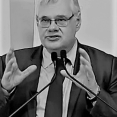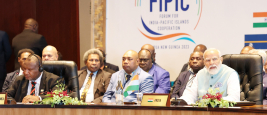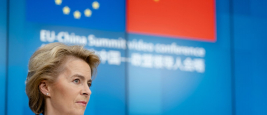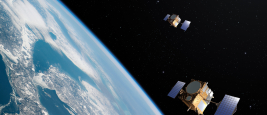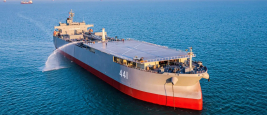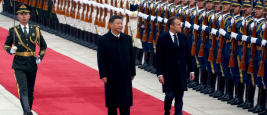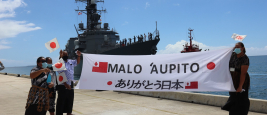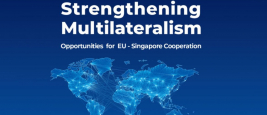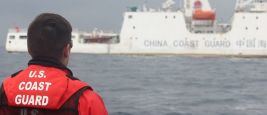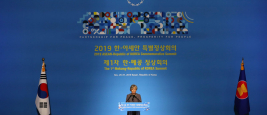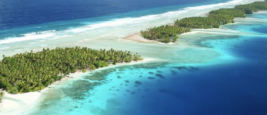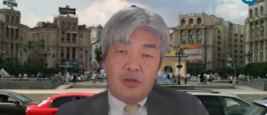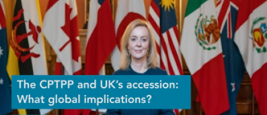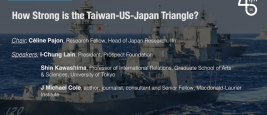Japan and the European Union are increasingly aligned on international economic policies, the product of a similar outlook toward China – concerned without being overtly hostile – and worried about over-reach by the United States.

Asia

Asia is a nerve center for multiple global economic, politic and security challenges. The Center for Asian Studies aims at providing documented expertise and a platform of discussion on Asian issues to accompany decision makers and explain and contextualize developments in the region for the sake of a larger public dialogue.
Ifri's Center for Asian Studies’ research is organized along two major axes: relations between Asia's major powers and the rest of the world; and internal economic and social dynamics of Asian countries. The Center's research focuses primarily on China, Japan, India, Taiwan and the Indo-Pacific, but also covers Southeast Asia, the Korean peninsula and the Pacific Islands.
The Centre for Asian Studies maintains close institutional links with counterpart research institutes in Europe and Asia, and its researchers regularly carry out fieldwork in the region.
The Center organizes closed-door roundtables, expert-level seminars and a number of public events, including an Annual Conference, that welcome experts from Asia, Europe and the United States. The Center’s researchers' work, as well as that of their partners, is regularly published in the Center’s electronic journal Asie.Visions.
Research Fellow, Head of Japan and Indo-Pacific Research,
...
Research Fellow, Center for Asian Studies
...Advisor to the Program on Pacific Islands, Center for Asian Studies
...Senior Advisor, Center for Asian Studies
...Associate Research Fellow, Center for Asian Studies
...Prime Minister Narendra Modi’s maiden visit to Papua New Guinea (PNG) on May 20-21, 2023, is a testament to India’s international positioning and search for a global role. In Port Moresby, Modi co-chaired the third Forum for India-Pacific Islands Cooperation (FIPIC) and announced a series of...
Transatlantic ties have had a rough go in recent months. After an unprecedented degree of alignment on Russia in the first half of 2022, including the quick and efficient rollout of a series of groundbreaking sanctions packages, the United States and Europe stepped back into dispute territory...
The G7 summit in Hiroshima showcased a new international order in the making: in a world where security is indivisible, the priority should be to uphold a collectively shaped rules-based order and find a modus vivendi with China. The G7 can work toward this by taking into account the...
While French President Emmanuel Macron’s state visit to China is viewed by some to be an exercise in stirring the pot, this does not mean that the European boat has veered off course. The EU is used to robust debate among and within member states, and can take this as another opportunity to...
In April 2021, the Chinese government officially, but rather quietly, established a new state-owned enterprise (SOE) named China SatNet. Its mission: build out China’s “mega-constellation” program for low Earth orbiting internet satellites, known as Guowang (“national network”).
Despite all the talks about the reshuffling of value-chains and the trend to a form of industrial “Desinicization” (or decoupling/disengagement from China), the example of South Korea does not vindicate such assertions.
In January 2023, the Iranian Navy staged a show of force near the Australian Exclusive Economic Zone (EEZ) amid growing tensions between Tehran and Canberra.
President Emmanuel Macron will visit China from April 4 to 8 for the first time since 2019 and five months after his meeting with Chinese President Xi Jinping, on the sidelines of the G20 summit in Bali.
Japan has recently stepped up its engagement with the Pacific Island Countries (PICs), building on its historical ties and strategic interests in the region.
Strengthening Multilateralism: Opportunities for EU-Singapore Cooperation EU-Singapore Think Tank Dialogue 2021
Multilateralism – broadly understood as a form of institutionalized interaction between several states to achieve agreed-upon goal(s) – is an essential tool and process of global political and economic cooperation. Ideally, the number of states involved should be as large as possible.
Lawfare at Sea in East Asia: Local Tensions, Global Implications
Since the end of 2019, more than 20 Notes Verbales have been submitted to the UN Commission on the Limits of the Continental Shelf regarding the claims in the South China Sea (SCS).
China's Priorities and Ambitions: Key Takeaways From the “Two Sessions” Les Jeudis de l'Ifri
A "Les...
Rethinking Health Governance in the COVID era: Visions from Europe and Japan
The COVID-19 pandemics has highlighted the significance, as well as the deep crisis of the health governance system.
Digitalization in the (post) COVID World: Views from Japan and Europe
The COVID-19 crisis has highlighted the importance of accelerating the digital transformation of both the industry and the society.
The Biden Administration: What Consequences for Allies? Views from Japan and France
The US allies greeted the election of Joe Biden with relief, but also with expectations.
Rethinking Economic Security in the (Post) COVID-19 World
The COVID-19 crisis has highlighted the risks of an excessive dependence on one single economic partner.
Conversation on Technological Change and its Implications, with Audrey Tang, Digital Minister, Taiwan Videoconference
To conclude our webinar series on "Technological Revolution and Regional Order in East Asia", we will host Audrey Tang, Digital Minister of Taiwan, to discuss the scope of...
Technological Revolution and Regional Order in East Asia Webinar Series
Against an increasingly tense backdrop of geopolitical competition, a new wave of rapid technological change is likely to transform the regional landscape of East Asia.
A New Player in the Indo-Pacific? South Korea’s New Southern Policy
President Moon launched the New Southern Policy as a key diplomatic initiative to strenghen the relationship with the Association of Southeast Asian Nations (ASEAN) and India.The comprehensive scheme is resting on the “three Ps” of People, Prosperity and Peace.
Japan, which began developmental programmes in the 1990s, has been eclipsed in recent years by China, now Africa’s leading trade partner.Pledge to invest US$30 billion on the continent includes a focus on training Africans to run their economy.
Partners in the Blue Pacific (PBP) is made up of US, UK, Japan, Australia, New Zealand, with the latter two expected to spearhead cooperation efforts. Some experts say France is already interested despite anger over Aukus security pact; the new PBP will become ‘multilateral rather than...
When Prime Minister Fumio Kishida becomes the first Japanese leader to attend a NATO leaders summit on Wednesday, he’ll be looking to stress the need for unity in preventing China from taking the “wrong lessons” from the Ukraine war as the bloc looks to expand its footprint in the Indo-Pacific...
Marine protected areas (MPAs) offer a solution for countries in the region to manage their maritime space. Access to scientific data is required to set MDA.
Prime Minister Narendra Modi’s visit to France on May 4 is his fifth since 2015, and the 10th such high-level bilateral visit.
An interview with Kazuto SUZUKI, Professor, Graduate School of Public Policy, University of Tokyo.
Paris and Beijing have agreed to build infrastructure projects in Africa, South East Asia and Eastern Europe. But will this help shine light on China’s opaque foreign investments? Or just give the appearance of doing so?
The UK is the first State which formally applied to join the CPTPP. Its bid was accepted in early June 2021.
France is eager to prevent the crisis from spiralling further as it recognises it is in its national interest, and President Macron’s favour, to end it. But damage has been done, writes Ahmed Aboudouh.
The United States is the linchpin of Taiwan’s security. Under Donald Trump’s presidency, as tensions with the People’s Republic of China grew, the US increasingly took steps to signal...






